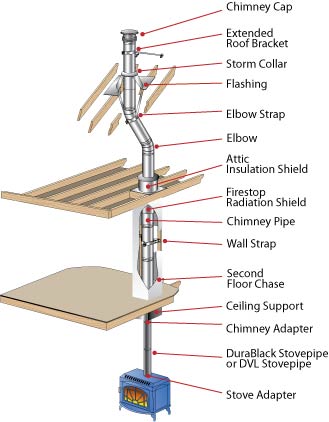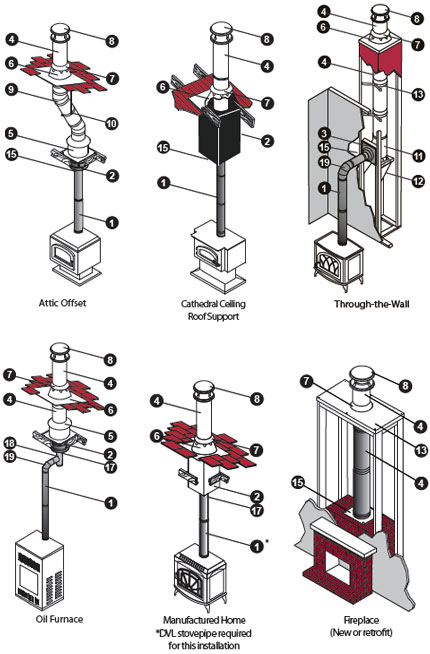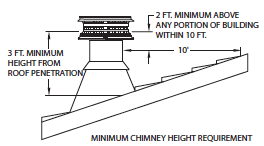Applications
DuraPlus Chimney is a triple-wall, all-fuel chimney for use with wood stoves, fireplaces, furnaces, boilers, stoves, ranges, water heaters, or other appliances fueled by wood, oil, coal, or gas.
Materials and Construction
.016" 430 stainless steel outer wall or .018" galvanized steel outer wall. .018" aluminized steel intermediate liner. .016" 430 stainless steel inner liner. insulated layers of ceramic blanket plus ventilated air space. Locks tightly with a precision twist-lock connection.
Clearances
2" clearance to combustibles.
Diameters
6"-8"
Listings
UL Listed to UL 103HT (MH7399).

Refer to our Typical Venting Installation drawings to select the appropriate component parts for your installation.
- A DVL/DuraBlack Chimney Adapter or DuraBlack Slip Connector must be used when connecting DVL or DuraBlack stovepipe to a Ceiling Support, Wall Thimble, or Finishing Collar. A Snap-Lock Adapter must be used when attaching snap-lock stovepipe to DuraPlus.
- A Wall Thimble must be installed with an appropriate section of chimney pipe for all horizontal through-the-wall installations. To accommodate thicker walls a wall thimble extension can be field fabricated.
- An Attic Insulation Shield must be used in all installations that pass through an attic, regardless of whether the attic is insulated or not. If chimney is enclosed in a chase in the attic space, an Attic Insulation Shield is not required.
- A Firestop Radiation Shield must be used when a chimney passes through a floor or ceiling without a Ceiling Support Box.
More Typical Installations:

| Installation Key |
| 1 | DVL or DuraBlack Stovepipe |
| 2 | Celling Support Box |
| 3 | Wall Thimble |
| 4 | DuraPlus Chimney |
| 5 | Attic Insulation Shield |
| 6 | Roof Flashing |
| 7 | Storm Collar |
| 8 | Chimney Cap |
| 9 | Elbow |
| 10 | Elbow Strap |
| 11 | Tee with Cap |
| 12 | Tee Support Bracket |
| 13 | Wall Strap |
| 14 | Firestop Radiation Shield |
| 15 | Snap-Lock Adapter, DVL/DuraBlack Chimney Adapter, DuraBlack Slip Connector |
| 16 | Extended Roof Bracket |
| 17 | DVL or DuraBlack Chimney Adapter |
| 18 | DVL or DuraBlack Tee |
| 19 | DVL or DuraBlack Elbow |
| 20 | Chase Top Flashing |
| 21 | Anchor Plate |
Planning Your Installation:

The following recommendations are a general guideline to assist in the layout and selection of the chimney components needed for your installation. Always follow DuraVent Installation instructions before installing your chimney system(enclosed with the cap or support box). Installation instructions can be viewed online at www.duravent.com, under catalogs and instructions.
- The diameter of the chimney should match the outlet size of the appliance. An improperly sized chimney results in poor draft and excessive creosote formation.
- Measure the diameter of the appliance flue outlet. Select the chimney and either DVL or DuraBlack connector stovepipe with the same size diameter as the appliance flue outlet. For fireplace installations, refer to the sizing chart in the back of the DuraTech section of this catalog.
- Determine if the installation is a through-the-roof installation or a through-the-wall installation. A through-the-wall installation will require additional components (Wall Thimble, Tee w/ Cap, Tee Support, and Wall Straps).
- Install the chimney in the interior of the structure whenever possible. A cold exterior chimney will produce less draft and will generate more creosote.
- If possible, avoid offsets that serve to restrict the natural draft. A straight vertical installation is more efficient and less likely to develop creosote. If an offset is required to avoid rafters or other obstructions, measure the horizontal distance required and the vertical height available. Both 15° and 30° elbows are available. Elbows greater than 30° are not allowed in the United States. A maximum of two offsets in a single installation are permitted. Refer to the offset table in the back of this catalog. At least one Elbow Strap is required for each offset. Elbow Straps ensure adequate support.
- Determine the minimum chimney height above the roof line. Building codes require a minimum of 3' above the roof penetration and at least 2' higher than any portion of a building within 10'. The termination cap is installed above that point. If chimney is more than 4' above the roof penetration an Extended Roof Bracket is required.
- Measure the roof pitch. For example, a 6/12 pitch has a vertical rise of 6" over a horizontal distance of 12". Select the appropriate flashing.
- Determine the total length of chimney and stovepipe required for the installation. To calculate the installed per length of 6"-8" DuraPlus chimney pipe, subtract 1 1/2" per joint. Subtract 1 1/4" per joint of DuraBlack stovepipe. Subtract 1 1/2" per joint of DVL stovepipe. Minimum chimney height, at sea level of straight vertical chimney is 10' to 15' above the appliance outlet. Higher elevations, or the use of elbows or a tee, will require approximately 30% to 60% more height to provide for an adequate draft.
- Be fire safe. Maintain at least 2" clearance to combustibles. Follow local building codes and have your chimney inspected by a certified professional.
Catalogs:
Installation Instructions:
Sales Sheet
Bulletins: